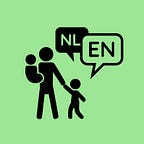Languages in relationships
Have you noticed that once a relationship between people has been started in a particular language, it is very hard to change this at a later time? For most people, speaking a different language than normally spoken with a ceertain person, feels awkward and somewhat wrong. This page is about that phenomenon, which is languages in relationships.
My own experience
Let’s start with our own story. My husband and I are both Dutch and have been raised monolingually Dutch by our parents (although I’ve receptively also learned some dialect). Changing to English was done as a conscious decision in preperation of our (then) future children, to give them a bilingual upbringing. We decided on this during a walk in the woods, and changed our language from Dutch to English right then and there. It took some effort in the first days (and weeks if we were tired or frustrated), but it soon started to feel natural. Now -after about 4 years- it’s just the way it is. Sometimes speaking Dutch to eachother even feels weird now.
It seems that my husband and I are one of the few that have changed our language use so drastically within a single day, or at all. When looking at my other relationships though, I still find it very difficult sometimes. One example is my parents; even though I normally only speak English to my daughter, it’s very hard to do so in the presence of my parents. My brain automatically sets back to Dutch when I see them, especially when in their home (which is also the house I grew up in). The language I have spoken with them for nearly 30 years is hard to change, even if I’m not even adressing them but only speaking in their presence.
The theory behind it
As I wanted to write about this subject, I tried to research the why and how of languages in relationships. Not much information could be found though. Many personal experiences and stories do concur however, that it somehow just feels wrong to change languages. This is especially the case when the relationship is more intense, or has been established long ago. The theory most often given, is that the language is so connected to our being, character and emotions. Changing the language used, would then feel like changing more than the words you choose. It’s changing a bit of the relationship itself, which can feel awkward or scary.
A very bilingual issue
As a monolingual person only has one language to use, they will never encounter the need to switch languages within a relationship. Sure, they might try a different language while communicating on holidays or other moments like that, but their core language will always be the same. Bilingual (or multilingual) people however, might have multiple reasons to change their relational language. Most of the reasons I heard have to do with either wanting to learn or practice a new language, and becoming parents.
It’s important to note that language switching (changing languages within conversations) is a different thing. If people are used to speaking 2 or more languages within a relationship, then that is their “starting point”. Changing to completely different languages, or starting to use one language exclusively, might feel just as weird though.
A new language
When learning a new language, one might have the wish to practice it with people they at first spoke their other language to. I see this mostly around me with expats and other newcomers in the Netherlands. At first the language used is English, as that is what most people have in common nowadays. At a later stage, they’ll learn Dutch and want to practice this more and more. Friends and partners are asked to speak Dutch with them for a while, and some might even switch completely to Dutch for a longer period.
Becoming parents
Just as our own reason to switch, a lot of people might switch their language use, when children get involved. You might be wanting to add a non-native language to the mix, just like we did. You might have already multiple languages in your family, and choose to give priority to one at the moment. You might move countries and switch the language accordingly to balance the minority and majority language input.
To be continued..
As there is little information and facts to be found about this subject, I’d love to hear from you!
What are your stories and experiences?
What are your ideas and theories on the matter?
What are your questions or tips for this particular blog?
What are your struggles regarding languages and relationships?
Let me know and let’s learn more together!
Originally published at https://www.nimke.nl.
